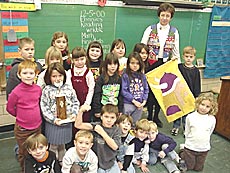|
All parents welcome
District 27 schools and parents
create unique learning opportunities
for students
Part
2
[DEC.
6, 2000]
There
once was a time when principals and teachers had to call parents in to the
school to discuss a child’s disciplinary or academic shortfall. But these
days, parents of Lincoln District 27 elementary students frequently visit their
child’s school to help teachers and administrators enhance the educational
process.
|
|
[click
here for Part 1]
Students
at Washington-Monroe will soon begin a creative project that will require
participation from individual school families during school vacations. The
School Community Council, along with several local businesses, is sponsoring a
literature garden to be planted this spring. Each grade level will assume
responsibility for a small garden plot filled with plants symbolic of stories
they have read. It will be a cross-curricular tool that draws in lessons from
science, geography, history and mathematics. The garden will also teach
responsibility, as the students will share the workload for planting, watering
and weeding throughout the growing season.

Mrs.
Cecil says that the School Community Council at Washington-Monroe has helped her
start new projects that she has always wanted to launch but never had the time.
Now, she has a team to help carry the load, and input from parents and teachers
on how new projects could be done. Candy Boulb was an active member of the
Washington-Monroe PTO before she was asked to be a parent representative on the
School Community Council. She has found that she now knows a lot more about what
her third grade son is learning and doing in school when she communicates and
shares ideas with teachers and administrators. She is able to serve other
parents by being better informed herself. "The SCC is just great for the
communication of ideas and goals — the teachers’ and the parents’,"
says Boulb.

[to top of second column in this
article]
|

[Mrs. Farwell's first grade class at Washington-Monroe
proudly displays the traveling trophy and flag they were awarded for
having the highest percentage of completed homework out of all
classrooms last week.]
The
School-Home Communication Committee, a subgroup of the SCC, developed a new
system for improving the communication between the school and parents. Teachers
send home family folders the second and fourth Monday of every month with the
oldest child in each family. The folders open up a consistent line of
communication between the school and parents, and eliminate many parents’
frustrations with receiving multiple copies of every note and newsletter.
Parents are then given an opportunity to communicate back with the teachers. A
parent-to-parent bulletin board placed just inside the front door is also
promoting more communication among parents.

A second
subgroup of the SCC, the Parent and Teacher Education Committee, determines the
need for teacher and parent in-service training. Kate Ewing, a teacher and
member of the SCC, coordinates the parent education program. The school offers
courses for parents on topics like "improving your child’s study
habits" and "reading to your child." Each course is led by a
previously trained parent.
(To
be continued)
[Marty
Ahrends]
|
|
All parents welcome
District 27 schools and parents
create unique learning opportunities
for students
Part
1
[DEC.
5, 2000]
There
once was a time when principals and teachers had to call parents in to the
school to discuss a child’s disciplinary or academic shortfall. But these
days, parents of Lincoln District 27 elementary students frequently visit their
child’s school to help teachers and administrators enhance the educational
process.
|
|
All
schools within District 27 are engaging parents as full partners with teachers
in helping students meet academic and character goals. School Community Councils
(SCC) are the engines that drive these partnerships. They have grown out of a
District 27 Board of Education plan to improve student achievement. Site-based
decision making was a key part of the plan. The SCC puts the administration,
teachers and parents around the same table, in a structure that encourages them
to make decisions on behalf of their own students and children.

Members
of the School Community Councils meet twice a month and are guided by a training
manual that helps them to establish four goals and expectations for each school.
Two of the goals are academic, dealing with studying, reading, communication and
the like. The other two goals revolve around character issues like respect and
responsibility. These goals cover the area where the responsibilities of the
school and the home overlap.

Washington-Monroe
Elementary School Community Council has adopted the goals of studying, reading,
respect and responsibility. After defining each goal, the Washington-Monroe SCC
developed a set of "expectations" for parents, teachers and students
for each goal. A School Community Compact that is distributed to all parents
summarizes the goals and expectations. It then becomes the joint responsibility
of teachers, parents and the students themselves to ensure that studying and
reading skills are enhanced, students are accepting more responsibility for
their personal success, and students show more respect to adults and peers.

[to top of second column in this
article]
|

[Principal Rebecca Cecil displays a copy of the goals and
expectations outlined by the Washington-Monroe SCC.]
Washington-Monroe
Principal Rebecca Cecil says, "The parents buy into these
expectations when they are part of the decision-making process, and when
they see other parents involved in the decision making."

Involving
parents is the key to success for the SCC. Mrs. Cecil says that she is
seeing more parents come to Washington-Monroe Elementary School during
the day, not just to have lunch with their children, but to help with
special activities at the school and in the classroom. Some parents are
even taking time off from work to share their careers or special hobbies
with the students. Parents have a better understanding of their role in
their child’s education because the School Community Compact spells
out their responsibilities clearly.
(To
be continued)
[Marty
Ahrends]
[click
here for Part 2]

|

